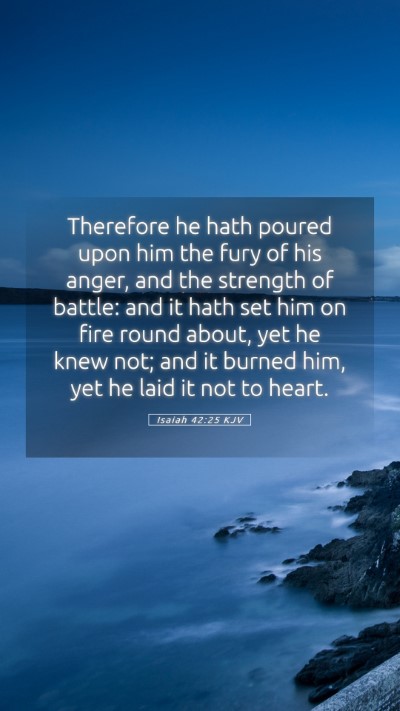Understanding Isaiah 42:25: A Comprehensive Commentary
Isaiah 42:25 states: "Therefore he hath poured upon him the fury of his anger, and the strength of battle: and it hath set him on fire round about, yet he knew not; and it burned him, yet he laid it not to heart."
This verse serves as a significant part of the prophetic message delivered by Isaiah, highlighting the consequences of disobedience and failure to recognize divine judgment. Below is a combination of insights from renowned public domain commentaries that shed light on its meaning and implications.
Bible Verse Meanings
Isaiah 42:25 reflects the theme of God's anger against a wayward people. It emphasizes the divine response to their rebellious actions and the resultant spiritual blindness that prevents them from recognizing their dire situation.
1. Matthew Henry’s Commentary
Matthew Henry emphasizes that the verse illustrates the seriousness of divine wrath when faced by unrepentant individuals. He points out that God's fury is likened to a consuming fire, suggesting the intensity of His displeasure. Furthermore, the imagery of fire symbolizes purification—while God’s judgment is painful, it is also designed to turn the hearts of the people back to Him.
2. Albert Barnes’ Notes
Albert Barnes notes that the expression "poured upon him" indicates a pouring out of God's anger as one would pour out liquid. He explains that despite experiencing intense suffering ("it hath set him on fire round about"), the people are oblivious to the source of their troubles. Barnes emphasizes that this passage serves as a warning about spiritual apathy and the dangers of failing to heed God's messages.
3. Adam Clarke's Commentary
Adam Clarke adds further depth by connecting the verse to the broader contexts of sin and judgment in Israel. He explains that the lack of awareness or acknowledgment of these divine warnings is a profound tragedy. Clarke elucidates that God's judgment is not arbitrary but is always aimed at leading His people to repentance and restoration.
Key Themes and Insights
- Danger of Spiritual Apathy: The verse underscores the peril of ignoring the signs of divine judgment—a theme prevalent in prophetic literature.
- God's Righteous Anger: It illustrates the balance between God's love and His holiness, emphasizing that a loving God must respond to sin.
- Call to Awareness: The imagery used invites readers to consider their own state of awareness regarding their spirituality and relationship with God.
Suggested Bible Cross References
- Isaiah 9:19: Highlights the consuming fire and the anger of the Lord.
- Jeremiah 6:29: Discusses the stubbornness of God's people in the face of judgment.
- Ezekiel 22:31: Mentions the consequences of unrighteousness and the consuming judgment of God.
Conclusion
In summary, Isaiah 42:25 serves as a powerful reminder of the consequences of ignoring God's warnings and the need for repentance. Through the combined insights of public domain commentaries, we gain a richer understanding of the verse's implications for spiritual life today. Understanding such Bible verses not only informs our theology but also encourages personal reflection and growth in our walk with God.


